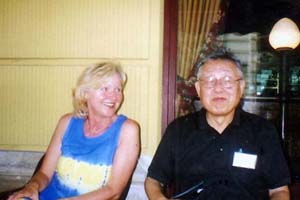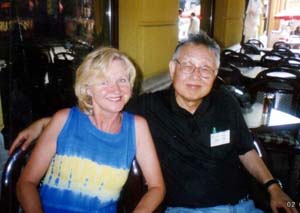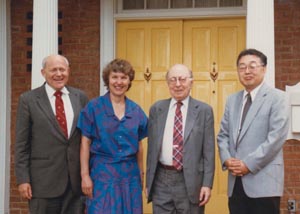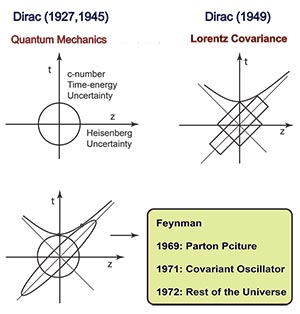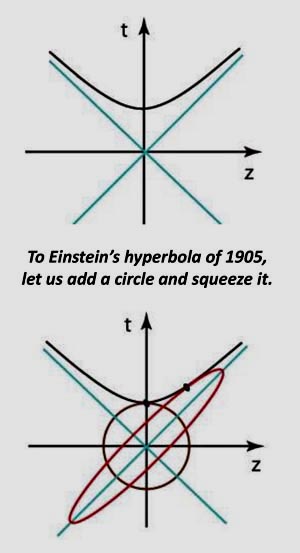Digital Literature
Art of making Webpages
- I am a physicist and my present job is to reorganize the research papers I
have published since 1961. I think the webpage is the best instrument to
carry out this job. If you do not know anything about me, you are invited to
my home page
My colleagues used to tell me I am a good conference organizer. These days, they are telling me I am a good webpage builder. This seems to be a good way of not saying I am a good physicist. Let us put off the question of whether I am a good physicist or not.
- If you think I am a good webpage builder, you will be interested in how I developed this new skill. I assume you are interested in building your home page to make yourself known to the world.
I started learning how to build webpages while I was in Princeton (1958-62) as a graduate student and a post-doc.
At that time, the color TV was still in its developing stage. The concept of webpage was far beyond human imagination. How was it possible? Here are my explanations.
- There were two movie houses in Princeton. One was and still is the
Princeton Garden Theatre.
The other was the Princeton Playhouse. It is gone, and there is now an
expensive restaurant called Mediterra.
During my Priceton years (1958-62), the Soviet Union was a
forbidden land, but the Princeton Playhouse used to show some selected
Soviet films.
- Among them were two volumes of Sergei Eisenstein's "Ivan the Terrible."
In these two volumes, Eisenstein portrays
this Russian Czar as two completely opposite
characters.
From there, I wondered how Eisenstein could do this. Yes, it is possible. In making a movie, the actors perform and the camera men shoot films according to the story written by the play writer. Eisenstein was different. His idea was to take photos first, and construct a story by arranging those photos. Indeed, I studied this aspect of Eisenstein in depth. I even went in 2009 to his hometown to study how he gained his creativity. Click here for the story.
This is what the webpage is all about. Go to old photos, look at them, and then construct a story by placing those photos in a coherent manner.
If you go to my webpages, you will note that the photos constitute building blocks for my logic.In January of 2012, I met these Russian film makers in Paris. We enjoyed talking about Eisenstein. They understood clearly when I told them how Eisensteinism works in building webapges.
- When I say I got my PhD degree from Princeton, people usually ask
me whether I met Einstein. Einstein died in 1955, and I went there in 1958.
Yet, I feel like showing them my photo with Einstein. I never met him.
How is it possible to have a photo with him?
Yes, here is how I could use Eisensteinism. There are many photos of Einstein in the public domain. I also have some photos of mine taken by professional photographers. The day before my commencement in 1961, I had my photo taken by Orren Jack Turner of Princeton. I did not know at that time was Einstein's photographer until 2010. He tool this photo of Einstein in 1947.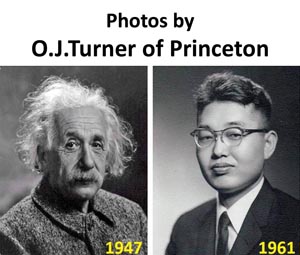
Thus, I have two different photos taken at two different times. The question is whether I could use Eisensteinim to combine these two photos to make one picture of mine with Einstein. The answer is to write a story based on these two pictures. What story did I write? Click here.
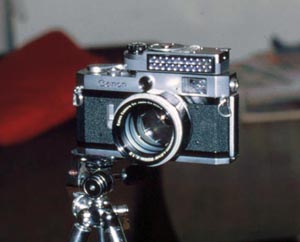
- My first camera, gift from mom (1959).
- Cameras.
While I was a student there, I was fortunate enough to own a camera. Cameras
were very expensive then, and Japanese just started exporting their products.
I started taking photos while I was in Princeton.
P-rade. Princeton has its unique culture called "P-rade" meaning parade of Princeton alumni. This event takes place every year before the June commencement. It is fun to watch the parades and take photos. I did, and I did even after I left Princeton. Without the concept of webpage, I thought I could show those photos to the world. How? I did not know, but I was ready to make webpages long before the internet technology became available.

- My first shortwave radio,
gift from dad (1951). - Shortwaves.
I was interested in long-distance communication from my high-school days.
While listening to those far away from me, I developed my passion to talk
to them.
Until 1970, RCA (Radio Cooperation of America) was the dominant electronics company in the world (like Microsoft these days). RCA's David Sarnoff Laboratory was in Princeton, and it was a great inspiration to me. I followed closely the technological development in wireless communication.
These days, I am crazy enough to own fifteen PCs. I have this many because I pick up an additional computer whenever the computer industry comes up with a new technology. For the same reason, I have eight digital cameras.
In 1962, I joined the faculty of the University of Maryland near Washington, DC.
- I continued working hard to catch up what is going on along the "main line" of
physics research. At that time, I had to do Regge poles and bootstraps to do
keep myself alive in the physics world. I was not happy with this phase of
my research life. You may click here
to see how unhappy I was.
- In October of 1962, John Toll (then the chairman of the physics department)
invited Paul A. M. Dirac to the University of Maryland, and I served as his
driver. I was fortunate enough to have a private audience with Paul A. M. Dirac.
It was like Nicodemus meeting Jesus.
Click here for the story. I then started believing in Dirac,
and decided to preach what he told me. I had to read his papers.
Dirac's writings are like poems, but he never used pictures or illustrations. I thus translated some of his earlier papers into cartoons. You are invited to see this cartoon. You will why my papers contain circles and ellipses.
In 1980, I started organizing conferences, and I am still known as a conference man. In order to advertise my conferences, I had to design the posters. The posters should contain eye-catching logos.
Here is one of the conference logos I designed. It tells the conference is about squeezed states of light. This aspect is well understood. However, did you know this figure came from my efforts to disseminate Dirac's physics?
In either case, I was preparing myself for the age of webpages, even though the internet concept was far beyond human imagination until 2000 AD.
- While running the conferences, I noted that about 70 percent of
the conference budget should be allocated to printing and mailing conference posters.
Thus, I was eagerly looking for a cheaper way of disseminating the conference information.
This is how I started developing a mass-mail system, known now as the Confmenu program. I then found out the best way to advertise my conference was to advertise other competing conferences. This is the origin of my Confmenu program. For this program, every conference needs a acronym (abbreviated short name such as OSA for the Optical Society of America). This is why every conference has its acronym these days.
In 1990, I started travelling extensively to attend conferences held in Russia and Europe.
- After the Cold war which lasted until 1990, Russia and
Eastern European countries were exciting places to visit. I took
many photos there without any idea of making webpages. In 2005,
I went to Kaliningrad with a digital camera, and took many photos.
By that time, I knew how to make webpages. Here is
my Kaliningrad page.
This page serves as a powerful tool in understanding Einstein's
philosophical background.
- Russia was not the only country I visited.
Click here for my travel
album. Whenever I see things, I have a tendency to interpret
them in terms of what I learned in the past, often those while I was
in high school. This is how I organize my pages.
- My China page was organized
according to the history of China I learned during my high-school years.
- My Poland page is
based on my constant curiosity in a country surrounded by big powers,
like Korea. I have been and still am interested in seeing wether
Poland and Korea are the same country. Whenever I meet Polish friends,
I tell Korea is ahead of Poland in every field, except one area. Do
you like to know? My Poland page contains the answer to this question.
- I love Paris.
There are many places associated with the persons I learned about in the
past, including Marie Curie, Jean-Paul Sartre, Henri Poincare,
Pablo Picasso, Victor Hugo, Ernest Hemingway, Jean-Jacques Rousseau,
Gioachino Rossini, Oscar Wilde, Frederic Chopin, Auguste Rodin,
Napoleon Bonaparte, and many others. I still do not know how many
museums are in Paris.
- I meet many people, and I have photos with them. Not all of them are shown here, but I can always go back when I need them, when I practice Eisensteinism.

- My China page was organized
according to the history of China I learned during my high-school years.
- My tank page tells
I grew up in the war environment. When I was born, Korea was
under Japanese military occupation. Japan was staging a war against
China, and then against the United States. I was in Korea during the
Korean war (1950-53) before coming to the United States after my
high-school graduation in 1954. I still love to tell war stories and
become excited when I see war machines. Russians love this tank page.
Thanks to those wars, I grew up without toys. I had to make my own toys to satisfy my curiosity. This is how I became interested in engineering and then physics. These days, computers and digital cameras are my toys. Needless to say, they are the essential tools in making webpages.
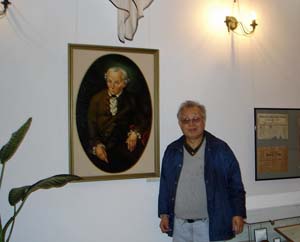
|
| with Immanuel Kant in Kaliningrad (2005). |

|
| |
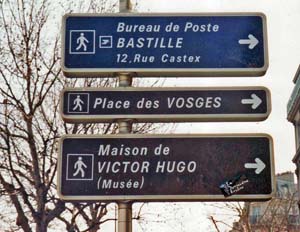
|
How can you attract viewers to your website?
Yes. You have a great web site. However, what purpose would it serve if nobody looks at your pages. The value of the web site is determined by the number of daily visitors to your site. There are a number of variables which will determine this number.
- Provide public services. You are quite familiar with the
page ysfine.com, and
the services it provides. Make the address as simple as possible.
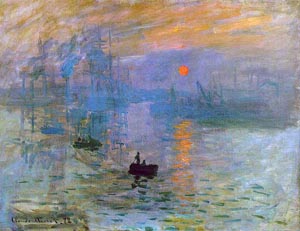
- The background and font colors play important roles for a given
webpage. From my webpages, you can see I pay extra attention to
these variables.
Claude Monet was one of the pioneers of the impressionist painting. Let us look at his work entitled the Sun Rise. The sun rise gives a good feeling to humans. It can be expressed in a simple form as shown in the Japanese national flag. On the other hand, the world takes different colors as the sun rise continues.
Claude Monet wanted to express this aspect in his painting of the sun rise. You can now see why Monet was so great.

- About 80 percent of Googlers are looking for beautiful women.
My website would become very popular if it contained photos of
Marilyn Monroe, but I cannot find reasons to post her photos.
However, my Pittsburgh page contains a photos of Vivien Leigh. There I talk about the first movie I saw in the United States. It was the Gone with the Wind. Many people come to my Pittsburgh page to see Vivien.
You are invited to my Princeton page. You will note that I brag about myself on the cover page. Until October of 2012, the webpage was
http://ysfine.com/princeton/old.html
with Actress Brooke Shields on the cover page, also with Einstein playing only a secondary role.
Brooke was in my son's Princeton class, and I was able to take many photos of this popluar girl in her academic gown while attending my son's commencement ceremony in 1987. For many years, googlers used to come to my Princeton page to see Brooke Shields instead of Einstein.
My website also contains photos of Einstein, Dirac, Wigner, and Feynman. You can guess whose photos are most popular among those who come to my website.
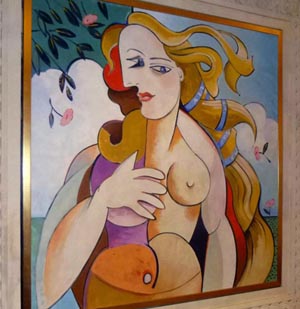
- The most important issue in building webpages is the organization to
achieve harmony. You are seeing a variation of Sandro Botticello's
Venus. I do not believe this was Picasso's painting, but someone wanted
to imitate Picasso. I spotted this painting at the Hotel Caesar Palace in
Las Vegas (USA).
Indeed, this variation tells us what Picasso is all about. Let us compare this with the original painting. Click here.
Picasso's Venus also has her eyes and her nose, but at different places. In the original painting they are arranged by God. Picasso wanted to achieve the ultimate harmony of the human body by completing the arrangement started by God.
In designing wepages, the key issue is how to achieve a harmony of photos and stories. I would love to create my own paintings, but God did not give me this talent. I would love to add background music to every webpage, but I still do not know how to do this without violating copyright laws.
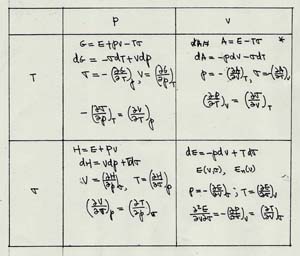
-
Wheeler's two-dimensional organization of Maxwell relations.
Powerful organization of 16 formulas.
- In physics, each web page should contain sound physics. In addition, the
arrangements of writings, figures, and photo's determine the quality of
the webpage. Unlike artists, physicists are fluent in the language of
matrices.
This two-dimensional language is a very powerful organizational tool. The webpage is the natural device for the matrix representation. I used this natural language to construct my home page:
http://ysfine.com/home/index.html,
and many other pages. with the links listed on the top row and on the left column.
- In this photo, Feynman is using a blackboard to explain his physics.
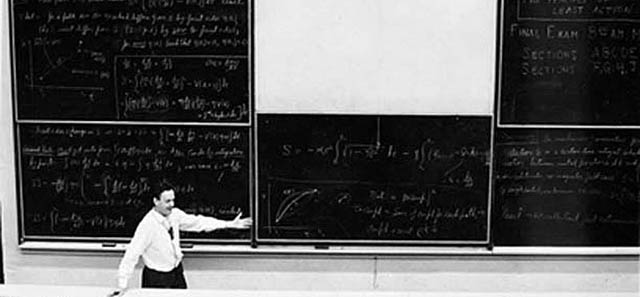
-
photo from the American Institute of Physics
These days, you present your research results using power-point screens. However, if you see the above Feynman photo, you will develop an instinct to use a big blackboard. This is still possible with wide-screen monitors. You will be interested in how Feynman could have presented his research results during the late years of his life. Click here.
It is always fun to imitate Feynman. You may be interested how I would like to present my research results in the Feynman style. Go to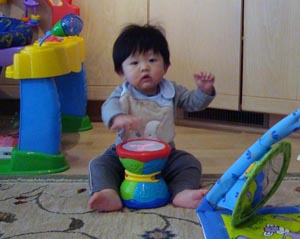
-
My grandson is imitating Feynman.
http://ysfine.com/home/dwf.html.
- Indeed, it is fun to try new ideas using internet technology. Like you,
I start writing a paper if I do not have ideas. These days, I start
making a webpage if I do not have ideas. I am still learning and
developing new ideas on web designs. You have seen many of my pages in
the past. You are invited to them at my magazine page:
http://ysfine.com/maga/index.html.
Please let me know if you have brilliant ideas along this direction. my email address is yskim35@gmail.com.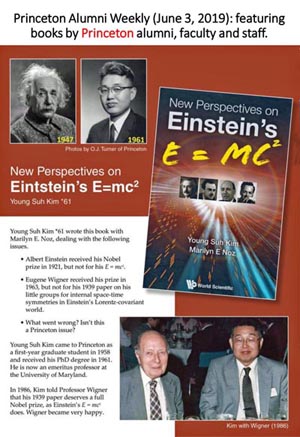
Clich here for larger image. - How was the wireless communication developed? Click here.
- Click here for Y. S. Kim's home page.
copyright@2019 by Y. S. Kim, unless otherwise specified.
